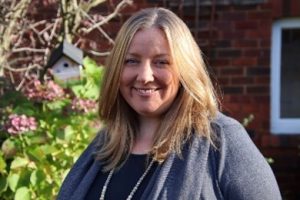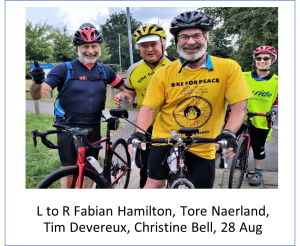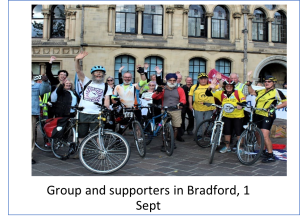09 Nov – One year on from COP26
By CAFOD’s Youth Delegation to COP26 in 2021 and collated by Matty Maslen
Last year, CAFOD sponsored a youth delegation to travel to Glasgow to attend the UN Climate Summit COP26.
A year on, as COP27 occurs in Egypt, we reflect on what has come from the past year for us personally, and for the climate movement more generally. One of our delegation, Alexander Ugoh, recently took part in a short film produced by Random Acts (Random Acts is Channel 4’s home for the world’s most creative short films): ‘Climate Grief, Climate Groove feat. Billie Marten’. You can view it on YouTube:
One of our delegation, Alexander Ugoh, recently took part in a short film produced by Random Acts (Random Acts is Channel 4’s home for the world’s most creative short films): ‘Climate Grief, Climate Groove feat. Billie Marten’. You can view it on YouTube:
During our visit to Glasgow, Alex worked on the CAFOD social media to highlight what our delegation was getting up to. It was from this social media promotion that he was given the opportunity to take part in the short film. “A contact got in touch with CAFOD asking to recommend any young adults interested in being part of a project revolving around climate grief and mental health.”
Alex said he was “personally drawn for the project because I’m of Nigerian heritage so, the effects of climate change on the more vulnerable developing nations really touches home for me.”
While we were in Glasgow, we took part in mass civil society action. We were part of a crowd of 100,000 people who marched through the streets of Glasgow to demand climate justice.
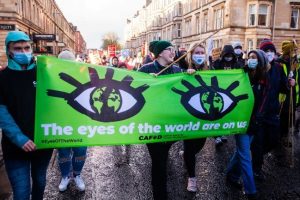 A few weeks ago, Matty attended a ‘one year on from COP26 march’ in Glasgow. It followed the same streets through Glasgow as we walked as a group. This year’s protest was organised by ‘Fridays For Future Scotland’. Matty said: “There’s no excuse to exclude young people from the conversation. We know what’s at stake and we’re ready to act – let us!”
A few weeks ago, Matty attended a ‘one year on from COP26 march’ in Glasgow. It followed the same streets through Glasgow as we walked as a group. This year’s protest was organised by ‘Fridays For Future Scotland’. Matty said: “There’s no excuse to exclude young people from the conversation. We know what’s at stake and we’re ready to act – let us!”
On 12th November this year, there was again world-wide civil society action. Members of the CAFOD Youth Delegation participated in the March in London. CAFOD has a number of resources about COP27 and you can use this link to access them https://cafod.org.uk/Campaign/COP27
Another of our delegates, Chukwuemeka, has written a piece for us about the floods in Nigeria:
NIGERIAN FLOODING
By Chukwuemeka Nwachukwu
Extreme Weather events on every continent are causing mass devastation, loss of life and livelihoods everywhere. We have seen floods ravaging several countries this year from Australia to Uganda, Pakistan, Guatemala, Vietnam, Florida and now, Nigeria. We’ve also seen record-breaking temperatures across the Globe, here in the United Kingdom we had a record-breaking heatwave. South Africa and East Africa, particularly Kenya, are facing severe drought and famine.
But for Nigeria, due to the release of water from the Lagdo Dam in Cameroon, many communities along the courses of River Niger and River Benue have been affected by floods. The construction of the Lagdo Dam, located in Northern Cameroon, started in 1977 and was completed in 1982.
At inception, Cameroon and Nigeria had an agreement to build two dams such that when water is released from the Cameroonian dam, the Nigerian dam would contain it and prevent it from causing floods. So, to cushion the effect of possible flooding from the Lagdo dam in Cameroon, the Nigerian government agreed to build a shock-absorber dam tagged Dasin Hausa Dam in Adamawa State. The Dasin Hausa dam was supposed to be two-and-a-half the size of the Lagdo dam, which was built to supply electricity to the northern part of Cameroon and allow the irrigation of 15,000 hectares of crops downstream.
Like the Lagdo dam, the dam project sited at the Dasin Village of Fufore Local Government Area of Adamawa State, was supposed to generate 300 megawatts of electricity and irrigate about 150,000 hectares of land in Adamawa, Taraba, and Benue states in Nigeria. But this Dam was never built by the Nigerian government, and funds meant for it were embezzled.
Released water from Dams are controlled. Imagine if Cameroon decides not to release water and the Dam bursts because of pressure? Half of Nigeria will be flushed into the Atlantic; the sooner Nigeria builds a dam the better.
There is a flood crisis now in Nigeria with over 33 out of 36 states affected. People are hungry, people are suffering. The cost of clean drinking water has gone up 5x the price. Nigeria is facing the most devastating flooding in the last decade! This will result to severe famine in most parts of the country next year as crops and food reserves have been washed away.
The numbers are staggering and increasingly worrisome:
– 1.3 million+ persons displaced
– 600+ deaths have been recorded
– 200,000+ houses destroyed/damaged
– 140,000+ hectares of farmland damaged.
Extreme weather events around the world this year show the reality of the climate crisis everywhere. The science is clear! Nowhere is safe until everywhere is safe. The time for action is now! We must drastically reduce the use of fossil fuels.
For the government in power, it is about photo-ops and election campaigns now and the citizens affected are left to manage. But with the rising sea level globally, this is a red-hot alert.
The flood has worsened the pre-existing humanitarian crisis in Nigeria. Millions of people are struggling to meet basic needs, and many might not survive this latest shock. Our major economic centres like Abuja are at a standstill because supply routes in and out of the city are blocked or destroyed. People are having difficulty working due to long fuel lines; and moving to help those in need is becoming harder and more costly. Nigeria will experience the economic fallout of this flooding for many years.
(Chuks has created a GoFundMe page to support victims of the flooding.)
Data from our USAID Feed the Future program – Rural Resilience Activity, shows that up to 150 farmers in the North East of Nigeria who are enrolled in the Activity have been affected by the flood, and 6000 hectares of farmlands flooded. This has led to the destruction of estimated yield worth of N3.1billion ($3M) across Adamawa, Borno, Yobe and Gombe states. We’re beginning to see a sudden rise (over 30%) in the cost of a bag of rice from N32-36k to N46k (approx. $84 to $107). The prices of bread, cereal, oil, beans continue to rise that the average person can no longer afford what we once took for granted. We are concerned that the flood will widen food insecurity, deepen farmer-herder crisis, and communal conflict over natural resources.
The water level is rising and it’s scary. The economic, health and infrastructural disaster caused by the floods is of truly catastrophic proportions. The response from the Nigerian Government has been weak, extremely slow, and inadequate. Strong measures must be taken to deal with this and to avoid repeats.
This year’s flooding proves that climate change is real. Rise in temperature, rise in ocean levels, excessive rains, are all indicative of climatic changes. The poor, the well to do and the rich are affected alike.
We need to stop the blame game and save the planet together.

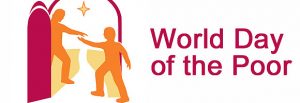 The Pope’s message encourages us to look into ourselves, the decisions we make and consider how best we can use our own talents and resources every day, to create a fairer world where no one suffers from emptiness or despair.
The Pope’s message encourages us to look into ourselves, the decisions we make and consider how best we can use our own talents and resources every day, to create a fairer world where no one suffers from emptiness or despair.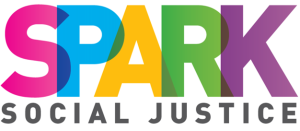 Are you passionate about wanting to eradicate poverty, care for the Earth and experienced at working with small groups? You could be the person we are looking for. We need someone to lead our successful SPARK Social justice project aimed at 18-30 year olds. We have around £10,000 pa available for the next 3 years, which equates to about 2 days per week for someone to provide the services we need to ensure the success of this project.
Are you passionate about wanting to eradicate poverty, care for the Earth and experienced at working with small groups? You could be the person we are looking for. We need someone to lead our successful SPARK Social justice project aimed at 18-30 year olds. We have around £10,000 pa available for the next 3 years, which equates to about 2 days per week for someone to provide the services we need to ensure the success of this project.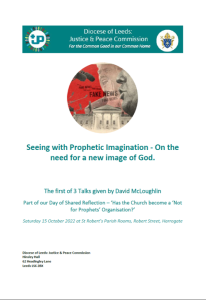 The First talk was entitled “Seeing with Prophetic Imagination”.
The First talk was entitled “Seeing with Prophetic Imagination”.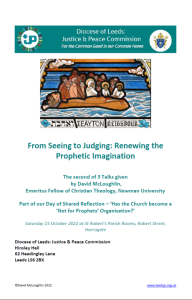 The second talk was entitled “From Seeing to Judging: Renewing the Prophetic Imagination.
The second talk was entitled “From Seeing to Judging: Renewing the Prophetic Imagination.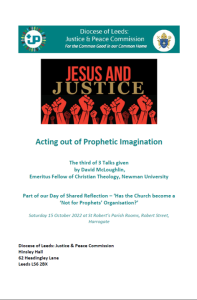 The third talk was entitled “Acting out of Prophetic Imagination”
The third talk was entitled “Acting out of Prophetic Imagination”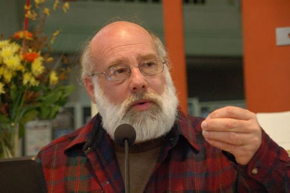 Jeff Halper, a Jewish academic living in Jerusalem, is the chair of ICAHD (Israeli Committee against House Demolitions). As part of a speaking tour in England he spoke at the St George’s Conference Centre in Leeds in early September. Over 50 people turned out for a talk by this very engaging speaker. What he had to say was not without controversy – not least because it turns upside down the conventional wisdom of the last 30 years about Israel Palestine!
Jeff Halper, a Jewish academic living in Jerusalem, is the chair of ICAHD (Israeli Committee against House Demolitions). As part of a speaking tour in England he spoke at the St George’s Conference Centre in Leeds in early September. Over 50 people turned out for a talk by this very engaging speaker. What he had to say was not without controversy – not least because it turns upside down the conventional wisdom of the last 30 years about Israel Palestine!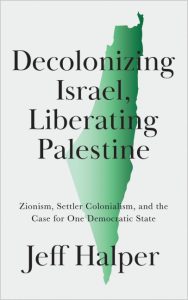 At the end of his presentation many people wanted to ask questions – as you probably do if you have got this far. Jeff would be the first to admit that the idea is still relatively new and needs more working out. Nevertheless, he built a very persuasive argument for taking this approach and if you are curious as to how this might be more than ‘pie in the sky’ thinking then I would recommend you to read his book about it: “Decolonizing Israel, Liberating Palestine” (2021) where he sets out in detail the case for viewing the situation in this way and a political vision of the practical measures that could actually bring it about.
At the end of his presentation many people wanted to ask questions – as you probably do if you have got this far. Jeff would be the first to admit that the idea is still relatively new and needs more working out. Nevertheless, he built a very persuasive argument for taking this approach and if you are curious as to how this might be more than ‘pie in the sky’ thinking then I would recommend you to read his book about it: “Decolonizing Israel, Liberating Palestine” (2021) where he sets out in detail the case for viewing the situation in this way and a political vision of the practical measures that could actually bring it about.